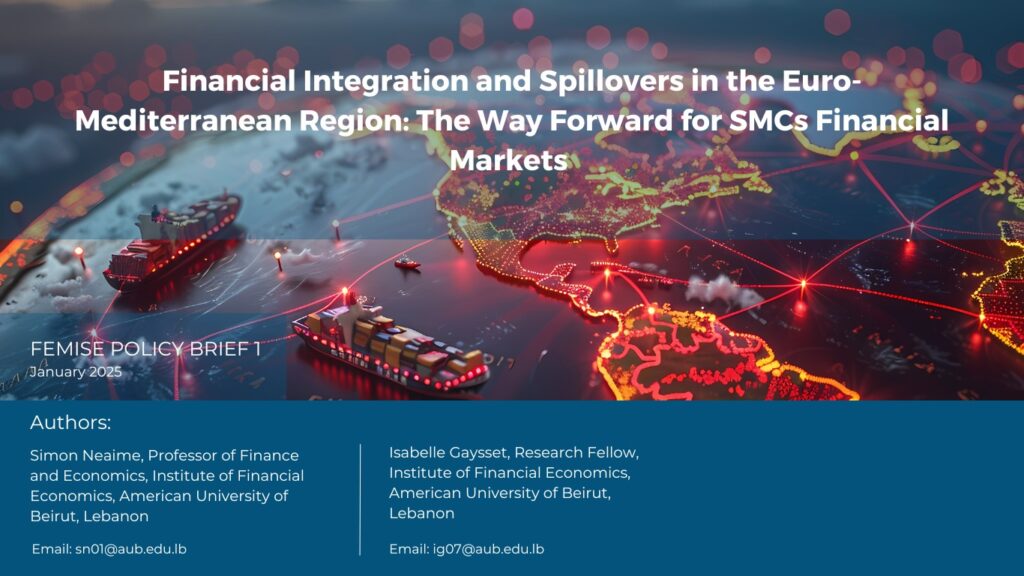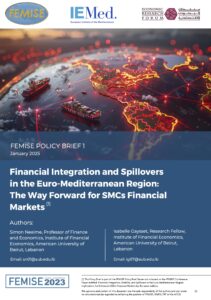
FEMISE is proud to launch its latest series of policy briefs, stemming from insightful conference papers presented at the FEMISE annual conference. These briefs are rooted in scientific research and offer actionable political recommendations to address critical challenges in the Euro-Mediterranean region.
The objective if this new series of Policy Briefs is to provide policy makers, international organisers, researchers and stakeholders in the EU-Med region with research-based policy recommendations that: advocate a better EU-Med integration; promote mobilization of investments towards green transition and sustainable economies; empower young people through innovation and entrepreneurship advocacy; and facilitate a better and more equal integration of youth and women, aiming to create pathways for decent employment.
These Policy Briefs aspires to drive impactful dialogue and action across the EU-Med region.
Context
The Euro-Mediterranean region faces complex financial interdependencies where economic shocks from leading European Union (EU) economies significantly influence the stability of South Mediterranean Countries (SMCs). This interconnectedness underscores the need for policies that support gradual financial liberalisation while reinforcing institutional frameworks to mitigate risks of instability and crises.
This FEMISE Policy Brief explores the dynamic financial spillovers between the EU and SMCs—Lebanon, Tunisia, Morocco, and Jordan—using advanced Structural Vector Auto Regression (SVAR) modelling. It highlights the vulnerabilities of SMCs to external shocks, particularly from the EU, and proposes actionable strategies, such as enhancing domestic bond markets and adopting phased financial liberalisation, to promote regional stability and integration.
By synthesising insights from empirical analysis and policy frameworks, this brief provides stakeholders with critical recommendations to foster financial stability, improve economic resilience, and deepen Euro-Mediterranean financial ties. The findings contribute to a roadmap for sustainable financial integration that benefits both the northern and southern Mediterranean economies.
 Executive Summary
Executive Summary
Using a Structural Vector Auto Regression (SVAR) model, this study analyses the dynamic financial spillovers of the European Union’s (EU) leading economies on their neighbours in the south (Lebanon, Tunisia, Morocco, and Jordan) and their implications on regional financial integration and stability.
Our empirical results show that major EU’s economies can generate significant regional spillovers through regional financial market linkages. We therefore argue with enhanced Euro-Mediterranean financial integration and vulnerability of the South Mediterranean Countries (SMCs), financial liberalisation should be implemented gradually because there is a need to ensure that proper institutional infrastructures, such as strong prudential regulations and supervision, are put in place in order to avoid any potential future financial instability or crises. Moreover, the development of the domestic SMCs’ bond market should be made a priority to reduce financial instability and to tackle the existing negative spillover effects within the Euro-Mediterranean region.
Read the full Policy Brief here
This Policy Brief is part of the FEMISE Policy Brief Series and is based on the FEMISE Conference Paper entitled: “Financial Integration, Stability, and Spillovers in the Euro-Mediterranean Region:Implications for Enhanced SMCs Financial Markets” by the same authors.
The opinions and contents of this document are the sole responsibility of the authors and can under no circumstances be regarded as reflecting the position of FEMISE, IEMED, ERF or the AECID


